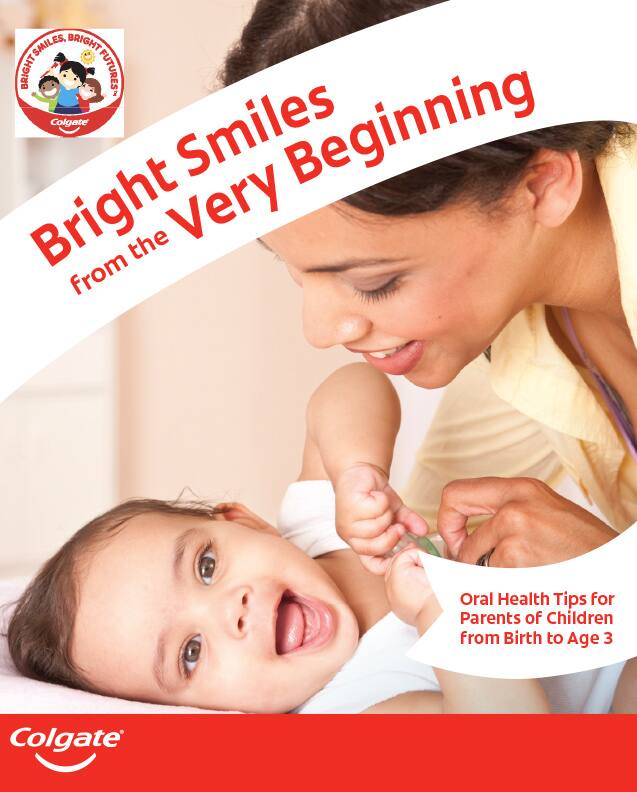Oral Health Tips for Parents of Children from Birth to Age 3
For children ages 0-2
Download
-
Size: 3 MB Download Publication

-
Daily Oral Care
Before Baby Has Teeth
Clean Baby’s Gums:
After breast or bottle-feeding
After giving medicine
Before bed
Use a soft, infant-sized toothbrush or clean, damp cloth.
When Baby Teeth Start to Come In
Brush teeth at least twice a day, especially:
After eating breakfast
After giving medicine
Before bedtime
Use a “smear” (very small amount) of fluoride toothpaste and a soft, infant-sized toothbrush. Visit the dentist by 6 months of age or when first tooth comes in. Wean child off bottle by age 1, according to the American Academy of Pediatric Dentistry.
Once Your Child Reaches Age 2
Brush at least twice a day with a “pea-sized” amount of fluoride toothpaste. Right before bedtime is the most important time to brush. Make sure your child spits out the toothpaste and does not swallow it.
Once Your Child Reaches Age 3
Brush at least twice a day with a “pea-sized” amount of fluoride toothpaste.
-
Helping to Prevent Dental Problems
Children change quickly. By becoming familiar with your child’s mouth, you will be able to notice changes and potential problems immediately.

Beware of Risk Factors for Tooth Decay
Frequent snacking on sugary and starchy foods
Falling asleep with a bottle or while breast feeding
Certain medications
Using a bottle or sippee cup throughout the day
Having a parent/caregiver with dental decay
Talk to your dentist about your child’s risk, and what you can do to help protect his/her teeth.
Before Baby Has Teeth
Clean Baby’s Gums:
After breast or bottle-feeding
After giving medicine
Before bed
Use a soft, infant-sized toothbrush or clean, damp cloth.
When Baby Teeth Start to Come In
Brush teeth at least twice a day, especially:
After eating breakfast
After giving medicine
Before bedtime
Use a “smear” (very small amount) of fluoride toothpaste and a soft, infant-sized toothbrush. Visit the dentist by 6 months of age or when first tooth comes in. Wean child off bottle by age 1, according to the American Academy of Pediatric Dentistry.
Once Your Child Reaches Age 2
Brush at least twice a day with a “pea-sized” amount of fluoride toothpaste. Right before bedtime is the most important time to brush. Make sure your child spits out the toothpaste and does not swallow it.
Once Your Child Reaches Age 3
Brush at least twice a day with a “pea-sized” amount of fluoride toothpaste.
-
About Fluoride

Common Sources of Fluoride
From the “Outside”:
Fluoride Toothpaste
Fluoride Varnish (applied at the dental or physician’s office, or at school)
Fluoride Gel (applied at the dental office)
From the “Inside”:
Fluoridated tap water
Some bottled water. Check the label to see if it says it says “fluoride” or “fluoridated.”
Fluoride supplements, like drops. These are prescribed by the dentist if your water isn’t fluoridated.
Some foods and beverages, like infant formula or cereal.
Call your water authority or local health department to see if your water has fluoride.
Fluoride is a natural element that combines with enamel on teeth and makes them stronger. It helps protect teeth and fights tooth decay.
Fluoride protects teeth by making them more resistant to acid and can even help reverse early signs of decay. Fluoride is an important part of making sure a child’s teeth stay healthy.
Topical Versus Systemic Fluoride
Topical fluoride strengthens teeth already present and is self-applied in the form of mouth-rinse, gel, and toothpaste. Systemic fluoride can be ingested into the body by drinking fluoridated water and taking dietary fluoride supplements such as drops, tablets, and oral rinses.
The Right Amount of Fluoride
It is possible for a child to get too much fluoride if there is high natural fluoride content in your water.
Ask your dentist about the potential of fluorosis, a condition that can cause defects (like white marks) on the tooth enamel of permanent teeth.
-
Visiting the Dentist

Regular visits to the dentist should start at 6 months of age. Do not wait until there are problems with tooth color or your child is in pain. The goal is to prevent problems.
Dental Checkups for Parents
As a parent/caregiver, you need to take care of your own oral health. Your children learn by watching you, so brush, floss and visit your dentist regularly.
At the Dental Visit
The dentist and dental hygienist will check your baby’s gums and teeth and answer any questions. They may:
Clean and polish the teeth.
Apply fluoride treatments (gel or varnish).
Take x-rays of teeth or jaw if necessary.
Check the level of bacteria in your child’s mouth.
Floss your child’s baby teeth.
Ask you questions about your child’s oral health, risk factors, and any early signs of disease.
Dental Visit: Things to Ask
Talk to your dentist about fluoride – especially if your child drinks unfluoridated water. The dentist may prescribe fluoride drops.
Ask about the use of “antimicrobials” for your child. These can help prevent tooth decay and may be recommended for some children.
-
Importance of Baby Teeth
What Baby Teeth Do
Save space for the permanent teeth and help the permanent teeth grow in straight.
Help children form sounds and words.
Round out the shape of the face. This helps your child smile and feel good, and have positive self-esteem.
Baby Teeth Are Important
Your child will start getting baby teeth at about 6 months of age.
Generally, by the age of 2, there will be 20 baby (primary) teeth – ten teeth on the top, and ten on the bottom.
Help for Teething Pain
From six months to age 3, your child may have tender gums as baby teeth “erupt,” or grow in.
Have your baby chew on a clean teething ring, cool spoon or cold, wet washcloth.
Rub the baby’s gums gently with a clean finger.
For toddlers, ask your dentist about teething gels.
-
Snacking & Food Choices
Snacking and Food Choices
There is bacteria, called “plaque,” that lives in everyone’s mouth — including the mouthof your young child. When food or drinks other than water come in contact with plaque, it makes an acid that can attack teeth.
Helping to Prevent “Plaque Attacks”
Limit food and drinks with sugar to no more than three times a day.
Offer sweet snacks as part of a main meal, instead of as a snack.
Help your young child learn to make healthy food, snack and drink choices. Offer choices that are low in sugar.
Provide low-fat snacks like raw vegetables; fresh fruits; low-fat cheese, yogurt or milk; or wholegrain crackers or bread.
Brush teeth after each time teeth come in contact with food.
-
Early Childhood Caries (Cavities)
Early Childhood Caries (Cavities)
Sometimes called Baby Bottle Tooth Decay, this disease is caused when sugary liquid surrounds the teeth too often – like when a child is goes to bed with (or walks around with) a bottle, or falls asleep while breast feeding.
Helping to Prevent Early Childhood Caries
Breastfeed at regular feeding times. Afterfeeding, wipe baby’s gums and teethwith a damp washcloth or brush the teeth.
If you bottle feed, remove the bottle as soon as you are done feeding. Wipe baby’s gums and teeth with a damp washcloth or brush the teeth.
Never put baby to bed with a bottle with anything other than water in it.
Don’t let the baby hold or walk around with a bottle or sippee cup for long periods of time.
Don’t let baby drink juice from a bottle.
Give fruit juice in a cup, and only at meal or snack time.
Train your child to use a sippee cup by the age of 6 months.
Wean your child from the bottle by age one.
Wean your child from sucking on other items, like a thumb or pacifier, by two years of age.








